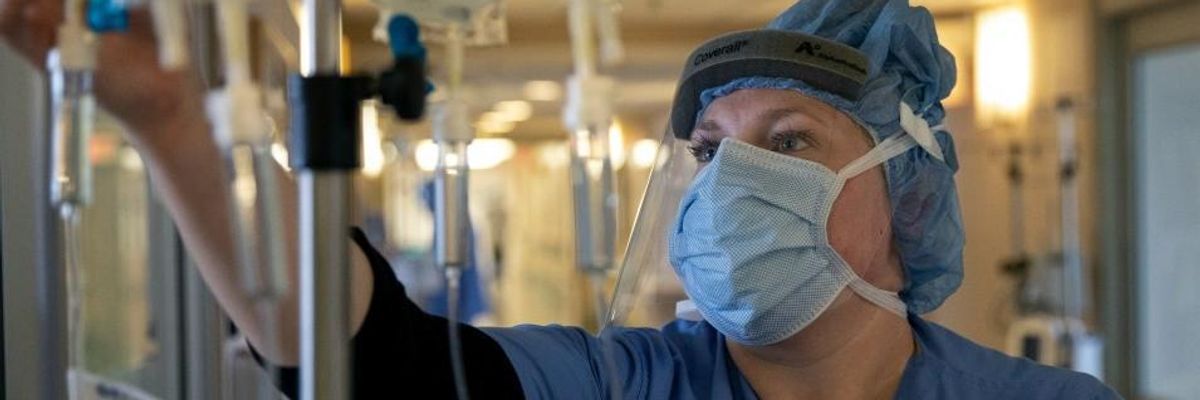With the coronavirus pandemic still raging across the United States and two vaccine developers awaiting emergency use approval from the federal government, a panel of independent experts on Tuesday recommended to the Centers for Disease Control and Prevention that healthcare workers as well as residents and staff of long-term care facilities receive top priority in vaccination distribution.
The Advisory Committee on Immunization Practices (ACIP) passed the "phase 1a" (pdf) recommendations by a vote of 13-1. According to the New York Times, "If the CDC director, Dr. Robert R. Redfield, approves the recommendations, they will be shared with states, which are preparing to receive their first vaccine shipments as soon as mid-December, if the Food and Drug Administration approves an application for emergency use of a vaccine developed by Pfizer."
Although states are not required to follow the CDC guidance in developing their distribution plans, some experts anticipate that they will. ACIP suggested that essential workers in education, food and agriculture, transportation, and utilities, as well as police, firefighters, and corrections officers could be in "phase 1b" and adults with high-risk medical conditions or who are age 65 or older could be in "phase 1c," but the panel did not vote on those demographics.
The panel considers healthcare personnel as those working in hospitals, long-term care facilities (LTCFs) such as nursing homes, outpatient clinics, home healthcare, pharmacies, emergency medical services, and public health. ACIP meeting materials say that as of last week, LTCF residents and staff accounted for 6% of Covid-19 cases and 40% of deaths in the United States.
By Tuesday evening, the U.S. had recorded nearly 13.7 million confirmed infections and over 270,000 deaths, more than any other country in the world, according to Johns Hopkins University's global tracker. In addition to Pfizer, the American company Moderna has also recently applied for FDA approval of its Covid-19 vaccine. Both vaccines require two doses per person.
As BuzzFeedreported on the ACIP meeting Tuesday:
The debate over who should get the first vaccines reached a fever pitch with recent reports of Trump administration officials pressing for seniors over age 65 to receive vaccines ahead of healthcare workers.
"My vote reflects maximizing benefits, minimizing harms, promoting justice, and minimizing inequities in distributing these vaccines," said panel chair Jose Romero, secretary of health at the Arkansas Department of Health.
...The government will distribute the first vaccines to states based on their populations, Alex Azar, head of the Department of Health and Human Services, said last week. The decision of who to distribute the vaccines to first will then ultimately be up to individual governors, he added.
The panel's recommendations on Tuesday were welcomed in a statement by the American Health Care Association and National Center for Assisted Living (AHCA/NCAL), which represents more than 14,000 nursing homes and assisted living communities across the United States.
"On behalf of our long-term industry, we applaud the ACIP for prioritizing our residents and caregivers for the first distribution of the Covid vaccine," said Mark Parkinson, president and CEO of AHCA/NCAL. "More than 100,000 long-term care residents have died from this virus in the U.S. and our nursing homes are now experiencing the worst outbreak of new cases since last spring with more than 2,000 residents succumbing to this virus each week."
Parkinson was referencing findings from the Kaiser Family Foundation released last week. Prior to that analysis, as Common Dreams reported earlier in November, AHCA/NCAL had called on federal lawmakers to take action to protect those living and working in LTCFs, releasing a report which showed record numbers of Covid-19 cases in such facilities that the organization tied to community spread.
"Given the asymptomatic and pre-symptomatic spread of this virus combined with the explosion of community spread across the U.S., we are extremely hopeful this vaccine will literally be a lifesaver for thousands of residents and expedite the reopening of our facilities to family members and loved ones," Parkinson said Tuesday.
"Now it is up to the governors and state health agencies to implement these recommendations and ensure our long-term care residents and staff are prioritized in the actual rollout of the vaccine to provide this protection as soon as possible," he added, expressing hope that ensuring LTCF residents and staff are among the first to be vaccinated will help to "save as many lives as possible."
Others highlighted the particular vulnerability of people in jails, prisons, or other detention facilities, and called for those populations to also receive priority Covid-19 vaccination:
The Marshall Project and the Associated Press have been tracking Covid-19 infections and deaths in U.S. state and federal prisons since March. As of November 17, the latest update from the initiative, at least 197,659 prisoners had tested positive and 1,454 had died.
"While we know more about how prisoners are getting sick, another group of people is at risk in these facilities: correctional officers, nurses, chaplains, wardens, and other workers," the report noted. "We know little about how coronavirus is affecting them, though they have the potential to carry it both into facilities and back out to their communities."

